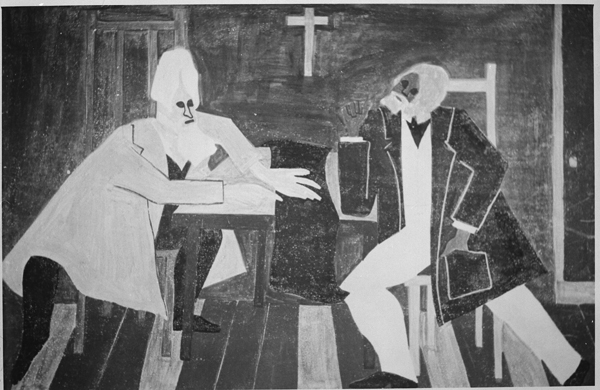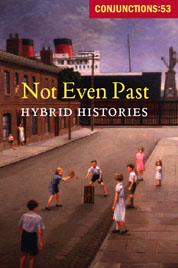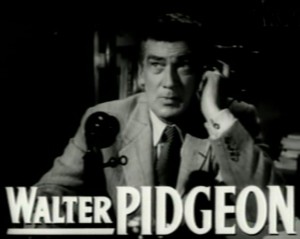Venus & Jupiter: The Conjunction of Brown & Powell

Frederick Douglass argued against John Brown’s plan to attack the arsenal at Harpers Ferry, Jacob Lawrence
One hundred and fifty years ago, a man named John Brown was put to death by the state. He was not gunned down in the street, nor was he unarmed. He was arrested by Robert E. Lee for leading a raid on the national armory at Harpers Ferry, Virginia. He had planned to arm America’s slaves with a hundred thousand guns. He was a white man, a preacher. Newspapers called him “a madman.” In most pictures he had “crazy eyes.” Abe Lincoln declared him “insane.” One thing’s for sure, he was mad. His rage boiled over.
American poets compared Brown’s life to a meteor that tore across the sky as he sat in jail, very nearly bisecting the interim of his conviction and execution. Emerson called him a saint, “whose martyrdom, if it shall be perfected, will make the gallows as glorious as the cross.” Thoreau said, “When a man stands up serenely against the condemnation and vengeance of mankind, rising above them by a whole body . . . the spectacle is a sublime one.” Both had attended his speeches and probably knew about the raid before it happened. Years later, Melville wrote, “the streaming beard is shown / (Weird John Brown), / The meteor of the war.” Whitman, who was there, put him in Leaves of Grass: “YEAR of meteors! brooding year! / I would sing how an old man, tall, with white hair, mounted the scaffold in Virginia; / (I was at hand—silent I stood, with teeth shut close—I watch’d; / I stood very near you, old man, when cool and indifferent, but trembling with age and your unheal’d wounds, you mounted the scaffold;)” The actor John Wilkes Booth was there, too. He wrote his piece in Lincoln’s blood.
Even Victor Hugo, in exile, called for Brown’s pardon. “There is something more frightening than Cain killing Abel,” he said, “and that is Washington killing Spartacus.” READ MORE >
Conjunctions 53
 is out now, the Hybrid Histories issue, and as always full of magic power. Among those: Andrew Ervin, Samuel Beckett, Thomas Bernhard, Robert Coover, William Gass, Tim Horvath, Peter Gizzi, Francise Prose, Paul La Farge.
is out now, the Hybrid Histories issue, and as always full of magic power. Among those: Andrew Ervin, Samuel Beckett, Thomas Bernhard, Robert Coover, William Gass, Tim Horvath, Peter Gizzi, Francise Prose, Paul La Farge.
Matt Bell’s incredible long story His Last Great Gift is also included, and can be read online here. It’s a brain eater, as we’ve come to expect on the regular from Mr. Bell.
Its first graph:
SPEAR HAS ALREADY BEEN living in the cabin overlooking High Rock for two weeks when the Electricizers speak of the New Motor for the first time. Awakened by their voices, Spear feels his way down the hallway from the dark and still unfamiliar bedroom to his small office. He lights a lamp and sits down at the desk. Scanning the press of ghastly faces around him, he sees they’re all here tonight: Jefferson and Rush and Franklin, plus his own namesake, John Murray. They wait impatiently for him to prepare his papers, to dip a pen in ink and shake it free of the excess. When he’s ready, they begin speaking, stopping occasionally to listen to other spirits that Spear can’t quite see, that he doesn’t yet have the skills to hear. These hidden spirits are far more ancient, and Spear intuits that they guide the Electricizers in the same way that the Electricizers guide him.
There aren’t that many magazines you can count on to be provocative and powerful from end to end most every time. Conjunctions is one of those. And you can subscribe for a year for $18 in the US. You will wish you had earlier, I can pretty much promise.
November 18th, 2009 / 4:24 pm
The Behavior of Pidgeons

Another short update. Here is a story by my friend Gabriel Blackwell from Portland. It makes me think about math cranks, those autodidacts who pester tenured professors at our nation’s major universities.
I think this is Gabe’s first published anything, and it is on Conjunctions. Way to go, Gabe.
